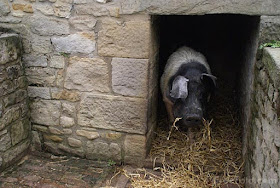The sweet chestnut, Castanea sativa, is a member of the fagaceae family (Oaks and Beeches), and is a native of Europe.
It has a very prickly seed pod, containing 4 chestnuts, each in its own hard brown husk. The secret to picking good chestnuts is get them as soon as they drop on the ground and open up. They won't be ready until they have dropped, and will go off if they have been on the ground too long.
The nuts can be roasted, used for stuffing, puréed into paste for use in chocolate cakes and various baked goods, or they can be candied, into the traditional French Christmas delicacy - Marron Glacé.
Ingredients:
2 pounds chestnuts, shelled
2 pounds granulated sugar
2 1/2 cups water
1 teaspoon vanilla extract
Preparation:
Place the chestnuts in a large pan with just enough water to
cover them. Bring the water to a boil and cook the chestnuts for 10 minutes.
Drain and discard the water. Rub the
husk off the cooked chestnuts.
In a separate pan, bring the 2 1/2 cups water, granulated
sugar, and the vanilla to a boil, stirring constantly. Simmer, stirring
occasionally, for 5 minutes.
Add the chestnuts to the boiling syrup and stir until the
whole mixture returns to a boil. Continue cooking, stirring frequently, for 10
minutes. Pour the candied chestnuts, along with the vanilla sugar syrup into a
large container, and cover. Allow the chestnuts to soak in the syrup for 12
hours.
Add the chestnuts and syrup to a clean pan and repeat the
process; this time boiling for 2 minutes, and then allowing to soak for 24
hours. Repeat this process 3 to 4 times, until the sugar syrup has been
absorbed completely by the chestnuts.
Preheat an oven to 120C (250F) and arrange the candied
chestnuts on a sheet of baking paper. Place the chestnuts into the oven and
turn off the heat. Allow the chestnuts to dry in the oven for 45 minutes to 1
hour, until they are dry to the touch.
Wrap in grease proof bon bon paper, or powder lightly with
confectioner’s sugar and place in a jar.
At Willowbrook we have finally finished planting The Nuttery and Bois de Marie.
In The Nuttery we have 12 Hazelnut trees, 10 Chestnuts, 9 Almonds, and 3 Walnuts. We finished planting The Nuttery a little while ago when we had friends down for the weekend, and their children Lucas and Elsa planted their own Chestnut trees...
They finished off their visit with a trip to the farm to pet the animals...






















































